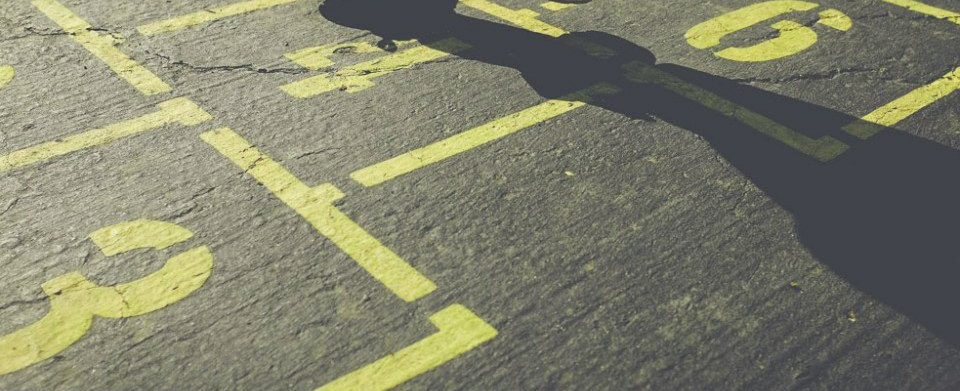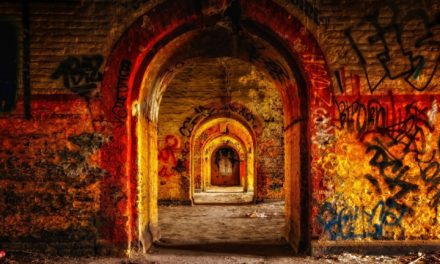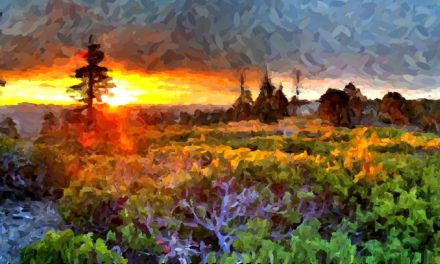Her straight blue lips on her small white face reminded me of a blank sheet of binder paper. No words yet written, no labored practice of connecting lines to make up letters. Just blank and empty.
Gloria was in second grade when I was in first grade with her brother, Richard. Our two classes shared the morning recess and the gray gloom that lingered over her was something I dreaded whenever she approached me.
“Will you walk with me today?” she would ask. Politeness for the sick girl always compelled me to concede. The forced pull-back of her slowness as we walked the playground perimeter made my legs ache. She would talk about her family, how her parents didn’t understand much English, how her mom made the best bacalhau. She said maybe I could come over some time to try it. I didn’t tell her that the only time I ate fish was on Fridays during Lent and only because I had to.
The gold painted hopscotch squares were where I really wanted to be when Gloria and I walked at the speed of slow pouring honey. My friends were taking turns, hopping on one leg, tossing their markers, playing with their balance, moving without being suffocated by the labored breathing of a sick girl.
“You are so nice to me,” she would say. I didn’t tell her I asked my mom if I really needed to walk with her. My mom suggested just taking one lap with her and then joining my friends. One lap took most of the recess.
One day after school in first grade, I sat with Gloria and Richard on the turquoise benches in front of my classroom waiting to be picked up. Gloria asked me if I wanted to walk around the playground while we waited. The weight of these walks again invoked a downward drag on my frame.
“Can you play hopscotch?” I asked.
She said she couldn’t as the jumping was too much for her heart. Richard shrugged his shoulders, remained seated and stared out towards the parking lot as Gloria and I stood up and began our slow crawl around the perimeter. She told me she wished she had long curly hair like mine. I didn’t tell her that I hated my hair and wished it could be straight like my sister’s.
When we got back to the benches, her mother was waiting with Richard. “Thank you. Thank you for walking with Gloria.” She nodded a few times, said some other words I couldn’t make out. I wasn’t sure if the words were in Portuguese or heavily accented English. I nodded and smiled back.
When Gloria moved to third grade, we didn’t share recess anymore. I didn’t miss our slow recess walks or her ashen skin. But when we sometimes waited on the turquoise benches to be picked up, I watched her blue lips and wondered if the words that slipped through them felt to her as fragile as they sounded.
“I miss recess with you,” Gloria said. I didn’t tell her that I was glad I could play hopscotch everyday now.
Later in the spring of second grade, our teacher told us one day that Richard would be out for a while because his sister had died. I felt the teacher’s words as a heaviness in my legs.
The following recess, I walked the perimeter of the playground. Our class didn’t go to that funeral. Funerals, the nuns said, were for children in third grade or higher. I accepted this, since Gloria had been in third grade.

In fourth grade, our class filled the pews in boy-girl-boy-girl pattern for the funeral of a classmate’s grandfather. With practiced solemnness, the girls sat in our blue plaid skirts and white blouses next to the boys in their navy pants and cardigans, heads bowed.
Father McAvoy’s homily was the usual mix of gratitude for the past and future freedom from suffering. He pronounced the accomplishments of this man, the sacrifices made for his family, the better place he had gone to now, without aches and pains, the salvation he would be granted because of the figure who hung on the crucifix behind the altar. Bright California sun spilled through the stained-glass windows, leaving colored patterns on the casket stationed in the main aisle.
We were reciting the Apostle’s Creed when it started. “He will come again in glory to judge the living and the dead, and His kingdom will have no end” was interrupted when the church bent and twisted. The floor felt like it was breaking under my Buster Brown school shoes. A ruction rose in the congregation, the shuffling of bodies deciding what to do, a murmur of panicked voices. Some quakes felt like strong bumpy jolts, but this one was sliding us back and forth in a slow but violent rhythm. Father McAvoy clutched the altar as our small hands gripped the back of the pews.
I wanted to run from the church, to be anywhere else. The pull-back in my legs that was familiar from my walks with Gloria, that learned restraint, my ability to override instinct kept me anchored in that jolting pew of school children.
A few people stepped into the aisle and held the casket on the bier. A family member at the front of the church shouted something and dropped to his knees. Others around him also knelt and started praying, a mumbling of voices among the creaking of the shifting rafters.
The tremor stopped, replaced by breaths released and hands unclenched. The people who had steadied the casket stepped back into the pews. Father McAvoy asked if everyone was okay and restarted the creed, his heavy brogue prompting us with “We believe in one God, the Father, the Almighty.” The infused smell of the funeral bouquets and incense from the thurible returned.
We spent the last day of our eighth-grade year remembering stories we would carry with us before the autumn would separate us, spread us out across different high schools. Many of us talked about the earthquake during that funeral.
No one talked about Gloria, or her blue lips. Even Richard did not mention her.
Before I left on that last day, I hopped through gold painted hopscotch squares. I sat on the turquoise bench and heard her voice from elsewhere telling me she loved my hair, that she thought I was nice.
I didn’t tell her that I missed her, but I did. I walked the perimeter one last time at the slow pace of the sick girl who reminded me of binder paper.







This sent my heart a-flutter. What a lovely, poignant, deep story.